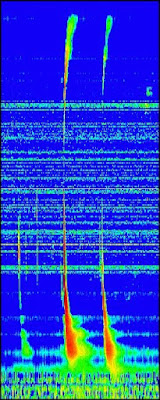 Many type III bursts were recorded by STEREO WAVES Ahead on January 26, betweeen 16 and 22 UT.
Many type III bursts were recorded by STEREO WAVES Ahead on January 26, betweeen 16 and 22 UT. GOES 14 recorded high B level X-ray fluxes during that period of time.
GOES 14 recorded high B level X-ray fluxes during that period of time. Above is a detail of the SWAVES spectrum for January 27.
Above is a detail of the SWAVES spectrum for January 27.Click on images for enlargements.
Many thanks to the Observatory Teams.






